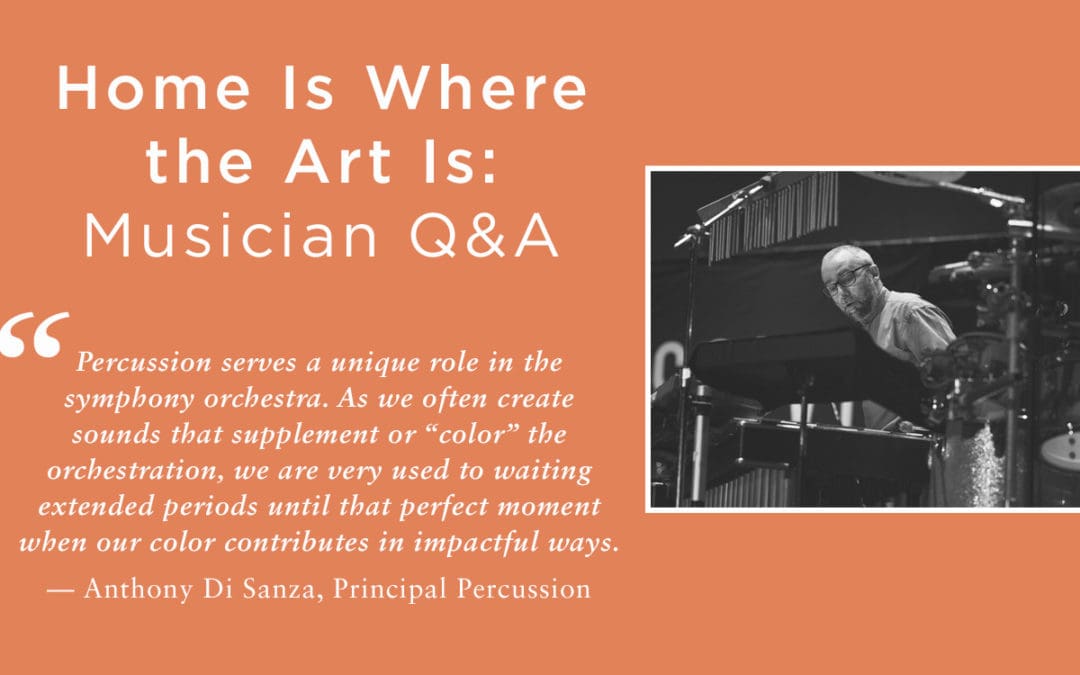Anthony Di Sanza, Principal Percussion, has been performing with the Madison Symphony Orchestra since 1999. Anthony holds the JoAnn Six Plesko & E.J. Plesko Chair. This Q&A is part of our Home Is Where the Art Is series of artist stories featuring our musicians.
What stories come to mind that led to your choice to make music a focus in your life?
When I was in 9th grade, I had one of the very few epiphanic moments of my life. I still remember many of the details leading to my moment of clarity. Throughout middle school I was a terrible music student! The stereotypical percussionist in the back of the band not listening and regularly disrupting rehearsals.
In December of that year we had a band concert in the gym. I remember shooting baskets before the concert (which we were not supposed to be doing). I remember feeling exactly as I always did before any band concert pervious, generally indifferent. Blue Ridge Overture by Frank Erikson was on the program and I remember generally liking playing the piece during rehearsals, but it impacted me about as much as anything else did prior to that moment — minimally.
Then it happened: while we were performing the piece I was struck by a bolt. I had an immediate and palpable feeling that music was suddenly very important to me and that this moment was somehow unique and special. By May of that year I won the “Most Improved Band Member” award and had started taking my music studies very seriously. My life changed in that moment and my epiphany set me on the path of becoming a professional musician and teacher.
Tell us about what happens during rehearsals from the point of view of your part and section in the orchestra?
Percussion serves a unique role in the symphony orchestra. As we often create sounds that supplement or “color” the orchestration, we are very used to waiting extended periods until that perfect moment when our color contributes in impactful ways. It is very possible that we may only play a couple of notes in a piece or movement (for example, in Dvorak’s New World Symphony, the percussionist plays a total of one note in the 1st, 2nd and 4th movements — and only a small triangle part in the 3rd movement). Our job is to be fully prepared for that one note. To do this, we must know everything else that is happening in the piece so that we do not get lost before the “big moment”. It is often the case in classical music that the less you play, the more important it is for you to know everything else that is happening in the music. As a violinist, it is very difficult to get lost because you are playing nearly all of the time. This may be a situation where not playing is more stressful than playing. The last thing we want to have happen is to stand for the lone crash cymbal note and then disastrously miss the crash. Very embarrassing and impossible to disguise from the audience and conductor!! So, a great deal of our rehearsal time is spent with a score, becoming as familiar as possible with everything happening so that we are fully confident to add our glorious moment of color.
What are your routines leading up to a concert performance?
I usually start preparing for a concert 2 weeks prior to the first rehearsal. Initially, I am required to become familiar with the music and assign the percussion parts. After that I dig into my own parts, usually starting with score study and listening. I will also use that time to identify difficult passages in the music so that I can be practicing those from the get go. As I am doing score study, I am also marking my part with cues from other instruments in the orchestra. It is very helpful for me to know when the brass enters or when a violin solo starts as what I am looking at on my part is often simply large groups of rests. If I know the other instrumental entrances, I am no longer simply counting rests, but actually engaged in the music.
During the preparation period I may also play some of my parts with a recording to help me get a sonic feeling for the moments that I am playing. This also reinforces my knowledge of the other sections in the orchestra. Finally, the day before the first rehearsal, I pack up any needed instruments and mallets knowing that I will need to get to rehearsal early enough to help get the percussion section set up and ready to go. Sometimes this is an easy task. Sometimes it takes many hours to pack move and set-up the section.
What music inspires you and what do you listen to for personal enjoyment?
I tend to listen to a wide variety of musics. I love listening to Western classical music as well as progressive rock, jazz and various global music traditions. In regards to global music I am especially fond of Brazilian, Middle Eastern and Indian traditions. Given today’s standard of global communication it is very easy to locate music that 20 years ago would have been very hard to find from home. Now it is at our fingertips!

